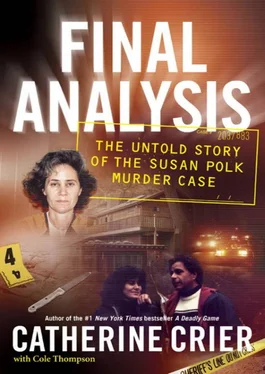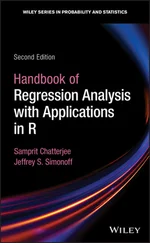Moving on from her abuse, Susan recalled her January 2001 suicide attempt and her decision to move out of the Orinda house and rent a cottage in Stinson Beach. During that trip, Susan decided not to return home but experienced a change of heart when Eli and Gabriel begged her to come back. It was while she was living in Stinson Beach that she began her diary, vowing to look at life with more humor. Normally, Susan said, she would run from the room crying when Felix would bully her. Now, she would not let herself become unglued; she would adopt a more sarcastic attitude when he tried to intimidate her. But according to Susan, her new approach only succeeded in further enraging her husband.
“I finally made up my mind,” she said. “I wasn’t going to behave like a caged bird. I would live my life. I could go shopping if I wanted to.”
Upon her return to Orinda, Susan observed that her three boys had changed. They were growing increasingly chauvinistic, more like Felix. To remedy the situation, Susan arranged to travel with her sons to show them the proper way to act around a woman, taking Gabe to Thailand and Hawaii, and Eli to Paris.
At lunchtime, jurors filed out of the courtroom, notebooks and pens in hand, but they were pretty much the only people who were guaranteed seats upon their return. Interest in Susan’s testimony was so great that court officers returned from the lunch break that afternoon to find a line that stretched from the second-floor courtroom across the hall to the public bathrooms. In a rush for one of fifty seats in the gallery, Susan’s own mother, Helen Bolling, was pushed to a spot in the back of the courtroom to hear the remainder of her daughter’s testimony that day.
While listeners had been riveted by Susan’s testimony in the morning, their interest would wane before she was finished for the day. What had begun as a poignant story of a flawed relationship between a fragile teen and her much-older therapist would soon degenerate into an outlandish tale of brutality, and spies and conspiracy theories. After the lunch break, Susan described how she had been repeatedly raped and drugged by her therapist husband who used her as a “project” to further his studies of hypnosis and ESP. Susan maintained that as a teenage patient, Felix spiked her tea with drugs, lulled her into a trance, and coerced her into sex. He later demanded that she make predictions on world events that he could pass along to his Israeli operatives.
“I wanted a normal life. I didn’t want to be a medium. I didn’t want to live like that,” Susan said, claiming to have predicted both attacks on the World Trade Center and to have thwarted the assassination of Pope John Paul II.
“Looking back over my life, I became convinced that he was actually poisoning me,” Susan told jurors, recalling that at one point she started experiencing numbness and tingling in her extremities. “Felix smiled and said it was MS,” she said. But when a doctor discounted that diagnosis, Susan surmised that her husband likely was poisoning her. To be sure, she stopped accepting food and beverages from him, a tactic that put an end to her symptoms.
It was soon after her surprise fortieth birthday party that Susan realized she could no longer stay married to Felix. “I looked around that room and saw mostly patients, patients who were his friends,” she recounted. “I thought, my God, what am I doing? I’m married to this guy who’s twenty-five years older, he’s my dad’s age, he was my therapist. I was ashamed of his values.”
When Susan told Felix of her desire to leave the marriage, he allegedly threatened to harm their children and hinted he might alert one of his patients, a lawyer who moonlighted as an assassin, about the situation. “It was a recurrent theme,” she added. “Whenever I brought up divorce, he would say, ‘You better think of the consequences to the children’ and ‘You better think of the consequences to the dogs.’”
The comment about the dogs seemed to strike a particular chord with Susan, who shuddered when she recalled the fate of the family’s German Shepard, Maxi, a dog that Felix had supposedly poisoned. When she confronted him about Maxi’s untimely death, he fingered the neighbor as the guilty party.
By day two, Susan’s plodding narrative and penchant for minutiae grew even more tiresome. She had been on the stand almost six hours and had yet to discuss the events that led to her indictment. Surprisingly, Sequeira had only voiced a handful of objections, the majority of which were related to hearsay testimony, but as the day wore on, even he appeared to be wilting.
Susan’s gentle tone grew brusque as she role-played both sides of the argument she had with Felix when she tried to leave the house for Stinson Beach in March 2001.
In a gravelly voice intended to be that of her husband’s, she asked, “Where do you think you’re going?”
“To the beach,” she then replied in a soft tone to indicate she was speaking.
“No, you’re not,” Felix fired back, allegedly striking her in the face as she attempted to flee the house.
Susan contended that for much of their marriage, Felix forbade her from having friends, leaving the house without his permission, and shopping for herself.
On Thursday, Susan told jurors she wanted to clear up an inaccuracy in previous testimony provided by Dr. Peters, the one who evaluated her after her Yosemite suicide attempt. It was Dr. Peters who had agreed during cross-examination that Felix’s call to 911 had saved her life that day.
Susan said she wanted to make it clear that she had called Felix, not because she was reaching out to a supportive husband, but simply because his was the only phone number she could remember in her alcohol and drug-induced haze.
Calling the jury’s attention to the actual timeline of these events was not a bad idea. Dr. Peters portrayed Felix as ultimately caring about the fate of his depressed and troubled wife. If Susan could make it seem as though this phone call was her doing, it might make Felix seem more the callous husband who cared little about his struggling wife.
Ultimately it was uncertain what impact the clarification had on the jury, since, on Friday, Susan interrupted her direct testimony to recall her eldest son, Adam, to the stand. It was an interesting move and her underlying motivation for it was not immediately clear. Susan seemed more concerned with trying to win her son’s affection and stir his emotions with remembrances of the past, than with providing evidence to counter the State’s claim that she murdered her husband in cold blood.
“Adam, you’ve testified that I’m crazy,” she continued.
Adam told his mother that he was the first person to suggest to his father that she was mentally ill. “I was the one who brought it to the table. He refused to believe it at first.”
“Are you aware that your dad tried to have me committed?”
“All that I’m aware of is that you’ll say anything you feel like, drag him and our name through the mud, to serve your cause.”
Susan cried as she read aloud from a Mother’s Day card from her eldest son: “Mom, I know we’ve all had our share of troubled times, but I will always love you.”
“Did you mean that?” Susan asked.
“Yes, I do love you,” Adam said flatly. “And I will always be there, but I’ve stated it before, you need some help.”
Susan asked her son if he was aware that the psychologist who examined her right after her 2001 suicide attempt testified that she was not crazy.
“I have a much better vantage point,” he replied. “I’ve spent twenty years in this situation. You’re a sick, sick person who’s in dire need of a very controlled environment for a very long time. If that doesn’t happen, I won’t feel safe, and I’m sure a lot of other people won’t feel safe.”
Читать дальше











